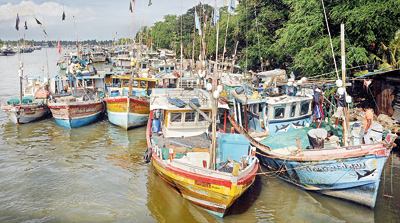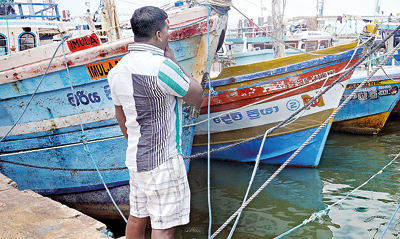News
Boat people: From economic trap to legal net
The number of Sri Lankans attempting to undertake the risky boat ride across the Indian Ocean to get to Australia has hit rock bottom this year, due to the concerted effort by government authorities to stop illegal migrants.

Fishing boats in Negombo: The mode of travel of illegal immigrants who risk their lives to reach Australin shores Pix by Amila Gamage
But the lives of those who attempted the perilous journey and ended up being apprehended now face an uncertain future, caught between the law and economic hardships.
While a majority of those who left the country did so due to economic reasons, mortgaging lands and houses or borrowing between Rs. 600, 000 to Rs. 800, 000 to secure a place on an Australia-bound boat, many who made the abortive attempt face a worse predicament economically than before, some of them told the Sunday Times..
B.J.Kumara Chaminda (38) from Negombo languished for two and a half years in jail unable to raise enough money to pay bail, after being apprehended mid sea.
His plight is compounded by the fact that the man who organised the group of around 60 would-be migrants, had convinced Chaminda to agree to register the boat carrying them in his name, in lieu of the Rs. 800, 000 he would otherwise have had to pay to be a “passenger.”
“It was the most foolish decision of my life,” said Chaminda, a father of two, now facing heavy debt and trying to make ends meet working as a middleman between fishermen and the fishmongers.

Chaminda: A dream for a better life now a nightmare
Chaminda embarked on the journey from Negombo in August 2012 leaving the shore past midnight one clear night only to be apprehended by the Sri Lanka Navy a few hours later .
The passengers were handed over to the Criminal Investigation Department (CID), who after recording statements produced them in the Negombo Magistrate court. They were remanded initially for 14 days.
While the passengers were released on bail after a two-week detention, Chaminda facing the charge of aiding and abetting an illegal transport of people was further remanded for 14 days.
His family was unable to afford the bail. It took him two and half years to get his bail amount reduced to Rs.50,000 which his mother managed to pay to get him out of prison, but his legal woes are far from over.
“The only reason I wanted to leave the country was to make a little money and come back. Many of my friends who went to Australia had settled there and are doing well so I thought of doing the same thing,” he said.
But it didn’t turn out the way he wanted it to be. These days, in addition to reporting monthly to the CID and attending court hearings, Caminda’s life looks bleaker than ever.
“I know I have done something illegal but the state has pardoned worst criminals who murder and rape.
We are victims too and I hope the government will pardon us so that we can get on with our lives or at least have the cases against us expedited,” Chaminda said, speaking on behalf of many others from his area who face the same plight.
M.K.Raju (28) also from Negombo, attempted a similar journey after paying Rs. 600,000 in 2013. Less than a day into the journey, the boat he was travelling in was apprehended by the Sri Lanka Navy. He spent 14 days in remand custody before being released on bail but the court case against him continues.
“I am a fisherman and I sold some land to get on the boat bound for Australia, but now I have lost that money and I have to struggle to pay lawyers till the case against me ends,” he said.
Senior Attorney-at-Law Godfrey Cooray who has experienced first hand the plight of many of the apprehended illegal migrants says a programme must be put in place to expedite such cases.
“A case against a person accused of offences under the Immigrants and Emigrants Act can take four to six years. It is up to the authorities, namely the CID and the Attorney General’s Department to expedite such cases,” he said.
The scenario is worse for those accused of organising the travel or aiding or abetting as their bail has to be granted by the relevant High Court. The process of making a bail application to the High Court can take several months, Mr. Cooray explained.
Meanwhile, the joint operations put in place by the Sri Lankan government and the Australia government has yielded results with no illegal boats reaching Australian territory this year while only one boat reached its destination in 2014.
Australian High Commissioner Robyn Mudie told the Sunday Times, in an email interview, that they are working closely with the Sri Lankan Government to bring a complete stop to the people smuggling trade. (See box for full interview).
Awareness programmes being carried out in coastal areas too have discouraged many from making the perilous journey.
“Now people are aware that even if you get there, they will not be able to enter Australia or settle down there, so fewer people are willing to take the risk,” said Chaminda.
However, for hundreds of others who attempted the journey and failed, overcoming the legal hurdles that now stand in their way will take many years.

